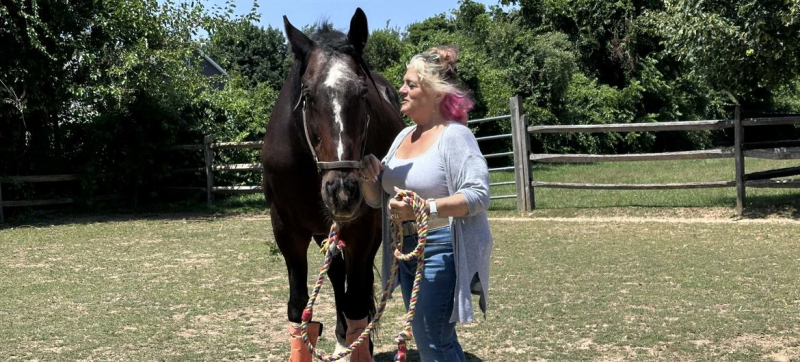- India Sees 9% Drop in Foreign Tourists as Bangladesh Visits Plunge |
- Dhaka Urges Restraint in Pakistan-Afghan War |
- Guterres Urges Action on Safe Migration Pact |
- OpenAI Raises $110B in Amazon-Led Funding |
- Puppet show enchants Children as Boi Mela comes alive on day 2 |
World Horse Day Celebrates Humanity’s Oldest Loyal Friend

Marisa Striano, founder of Spirit’s Promise, a sanctuary for rescued horses.
Spacious paddocks, green pastures, and a devoted all-female staff: on Long Island, a strip of land near New York City, horses once destined for slaughter are given a second chance—to live and help people heal. The farm, founded in 2010 by Marisa Striano and named after her beloved horse, Spirit’s Promise, offers healing for both horses and humans.
The United Nations marked the first-ever World Horse Day on July 11, established by the General Assembly to honour the long-standing relationship between humans and horses, and to advocate for their protection and welfare.
From ancient battlefields to modern-day therapy centres, horses have stood by humanity’s side for millennia. Yet in today’s high-tech world, many have forgotten that legacy.
“Horses didn’t just help us survive,” says Striano. “They built America with us. They ploughed the land, they carried people.”
In Mongolia, where the World Horse Day resolution originated, horses are revered as sacred animals central to national identity. Children learn to ride before they walk, and traditional songs praise horses’ loyalty and strength.
Though largely replaced by machines, horses remain present in sport, tourism, therapy, and entertainment. “Horses haven’t lost their value—we’ve just stopped seeing it,” Striano notes.
Horses that are sick, ageing, or retired from racing are often shipped to slaughterhouses. Striano’s farm provides a safe haven for 19 such horses, including retired police mounts, breeding stallions, and Amish workhorses.
“One of them is Gus—he’s 107 in human years,” says Striano. “He’s retired and in love with his blind companion, Ramona. They’re inseparable.”
Horses are deeply emotional, intuitive beings. With near-360-degree vision and keen emotional awareness, they make ideal therapy partners.
At Spirit’s Promise, horses help children with disabilities, survivors of abuse, and older adults with dementia. They are often called “mirrors of emotion,” sensing people’s inner states—even those they try to hide.
“Horses don’t lie—and they can’t tolerate lies in others,” says Striano. “They’ll walk away from false fronts but stay with you if you’re honest, even if you’re sad or angry.”
Striano recalls one transformative encounter: a young man recovering from drug addiction found unexpected peace with a horse named Heartbreaker.
“She walked up to him and just accepted him,” she recalls. “They sat together in silence. It was complete peace—trust without words.”
When the man's mother approached, the horse reacted protectively. The young man whispered, “She hides behind her religion, but she hasn’t forgiven me. She’ll never say it—but the horse saw it.”
For Striano, it confirmed what she has long believed: “Horses don’t respond to appearances. They see the soul—and they still choose to be with us.”
The debate over horse exploitation continues—from carriage rides to racing. “I hate racing,” says Striano. “It used to have a purpose, now it’s just money. Horses are pumped with drugs and used up.”
Still, she recognises ethical complexity. “Those carriage horses feed families. But horses aren’t tools. They’re living beings. Balance is needed.”
For Striano, the farm is a space to rebuild trust between species. “When they come up to me, I thank them. They’re not with you because you broke them. They’re with you because they chose to be.”
According to the UN Food and Agriculture Organization, there are around 60.8 million horses worldwide. In the U.S. alone, 2.4 million horses live on 63,000 farms. Mongolia has 3.4 million horses—almost one per person.
Globally, 112 million working equids (horses, donkeys, mules) support the livelihoods of 600 million people in low- and middle-income countries.
World Horse Day is a call to honour their labour, loyalty, and healing presence. “A horse is a gift,” says Striano. “And we have no right to lose it.”

